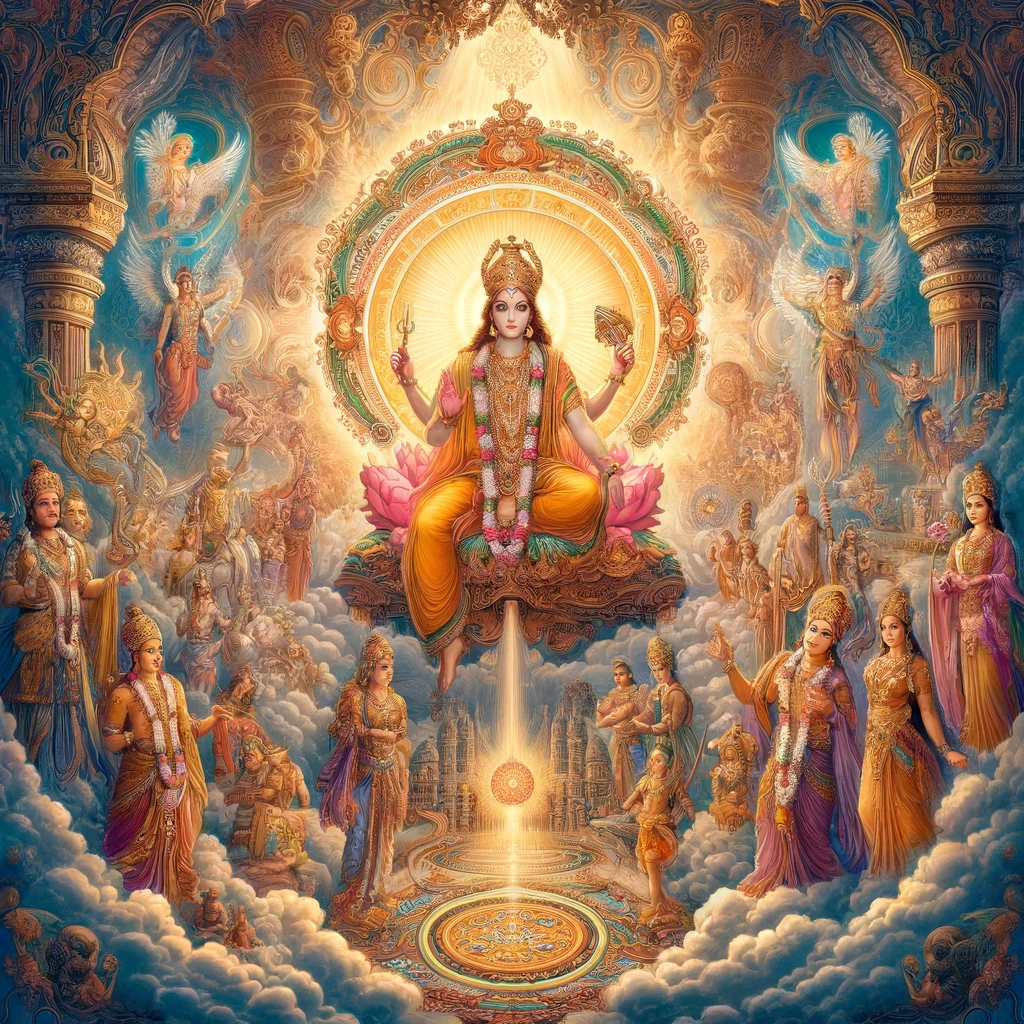ಅಗ್ರಣೀರ್ಗ್ರಾಮಣೀಃ ಶ್ರೀಮಾನ್ ನ್ಯಾಯೋ ನೇತಾ ಸಮೀರಣಃ
ಸಹಸ್ರಮೂರ್ಧಾ ವಿಶ್ವಾತ್ಮಾ ಸಹಸ್ರಾಕ್ಷಃ ಸಹಸ್ರಪಾತ್
agraṇīrgrāmaṇīḥ śrīmān nyāyo netā samīraṇaḥ
sahasramūrdhā viśvātmā sahasrākṣaḥ sahasrapāt ||24||
Agranih (ಅಗ್ರಣೀಃ)
'Agra' means leader. 'Agranih' refers to one who stands as the leader of all or one who leads from within to subdue evil. A prime example of this is the Mahabharata war. For the establishment of dharma, God appeared as the charioteer of the Pandava army, embodied specially in Arjuna, destroyed wickedness, and bestowed a unique message to the world through the Bhagavad Gita. At a glance, the Mahabharata is a great war, but it has a direct connection to our lives. Life itself is a battle. Our heart is the battlefield of Kurukshetra. Within it, we have our own Kauravas that mislead us and Pandavas that warn us. When we fall prey to the deceptive powers that lead us astray, misusing our precious faculties like the blind Dhritarashtra or the willingly blindfolded Gandhari, the divine within us as the leader annihilates these evil forces. The Mahabharata's core message is that surrender to the divine is what can save us.
Gramanih (ಗ್ರಾಮಣೀಃ)
'Grama' means community. 'Gramanih' refers to God, who rules the community and subdues the wicked. He is the regulator of all living communities, the deities' community, filled with boundless knowledge and bliss, restraining the tamasic beings living under the pretense of religiosity, and protecting the sattvic nature, God is Gramanih.
Shriman (ಶ್ರೀಮಾನ್)
Commonly, the wealthy are considered to be those with a lot of money. However, true wealth is not money, because money is "fleeting wealth." We see many instances in our daily lives where once millionaires become beggars. Money comes in ways we don't know, and it leaves just as mysteriously. If we want to be truly wealthy, we must acquire "everlasting" wealth. The knowledge and wisdom derived from the Vedas are such rare wealth that never fades. Since God is the lord of Saraswati, the goddess of knowledge, He is Shriman. As previously mentioned, God has graced us with the most valuable of all wealths - the five 'Shrees' (resources): the eyes, ears, mind, speech, and breath. There is no greater wealth for a human being than these, and we must never misuse them. The peace mantra tells us to see good, do good, hear good, and think good. Om Bhadram Karnebhih Shrunuyama Devah Bhadram Pashyemakshabhiryajatraah Sthirairangais Tushtuvamsastanubhih Vyashema Devahitam Yadayuh Swasti Na Indro Vriddhashravah Swasti Nah Pusha Vishvavedah Swastinas Tarkshyo Arishtanemih Swasti No Brihaspatirdadhatu Om Shanti Shanti Shanti Generally, we live our lives chasing money and forget the divine sanctuary while thinking about our sustenance and our progeny's future. The Gita offers us divine protection. Ananyashchintayanto Mam Ye Janah Paryupasate Tesham Nityabhiyuktanam Yogakshemam Vahamyaham (Gita 9:22) This means, for those who worship me with undivided devotion, I secure what they have and provide what they lack. Therefore, instead of presenting our monetary wishes before the most prosperous God, if we live with complete faith in Him, He will fulfill all our desires and protect us.
Nyaya: (ನ್ಯಾಯಃ)
Ne + Aya = Nyaya. Avavyaya is a common term known to everyone. Here, "Aya" means profit. The Supreme Being, who is the ultimate source of all ethical principles and righteousness, brings great gain or benefit to the devotees is Nyaya.
Neta: (ನೇತಾ)
"Neta" means leader or guide. Lord is the leader of the entire animate and inanimate world, the deities like Brahma, and the senses, as well as the five elements and the world of five elements. Lord, in various incarnations, has acted as a leader and has protected the earth and us. So, Lord is Neta, the leader.
Samiranah: (ಸಮೀರಣಃ)
"Samiranah" means the inspirer or motivator. There are various demonic and divine forces within us that inspire and motivate us. We are influenced by these forces. However, there is one Samiranah, the controller, who is present within us and regulates all these forces. It means, "May that God inspire our minds towards the right path."
sahasramūrdhā (ಸಹಸ್ರಮೂರ್ಧಾ) viśvātmā (ವಿಶ್ವಾತ್ಮಾ) sahasrākṣaḥ (sahasrākṣaḥ) sahasrapāt (ಸಹಸ್ರಪಾತ್)
The lines in this shloka describe the omnipresent nature of the Lord in a thousand forms. As mentioned in the Purusha Sukta:
"Om sahasra-shirsha purushaha sahasraksha sahasra-paat Sa bhumim vishvato vritya atyatishtaddashangulam."
Here, 'sahasra' means 'infinite' or 'countless.' Similarly, the words 'shirsha' (heads), 'aksha' (eyes), and 'paat' (feet) indicate the all-pervading, omnipotent nature of the Lord. The concept of the Lord's omnipresence is further explained in the Bhagavad Gita when Arjuna witnesses the cosmic form of the Lord:
"Sarvatah pani-padam tat sarvato'kshi-shiro-mukham Sarvatah shruti-mal loke sarvam avritya tishthati." (Bhagavad Gita, Chapter 13, Verse 13)
This verse signifies that the Lord has hands, feet, eyes, and heads everywhere, and He pervades and covers everything in the universe. There is no place where He does not exist. He is the inner self of all beings and is present within every living entity, including humans. His infinite qualities are reflected in His countless forms and attributes. He is the embodiment of knowledge and bliss, and His divine qualities are limitless.
In summary, these verses emphasize the all-pervading and omnipotent nature of the Lord, showcasing His presence everywhere and in everything in countless forms and manifestations.
sahasramūrdhā (ಸಹಸ್ರಮೂರ್ಧಾ)
He who has a thousand heads, indicating that He is the inner self of all living beings.
Vishwatma: (ವಿಶ್ವಾತ್ಮಾ)
The soul of the universe; He who pervades everywhere; the inner self of Brahma and other deities.
Sahasraksha: (ಸಹಸ್ರಾಕ್ಷಃ )
He who has a thousand eyes, signifying that nothing is hidden from His sight.
Sahasrapat: (ಸಹಸ್ರಪಾತ್)
He who has a thousand feet, suggesting that there is no place where He does not exist.


